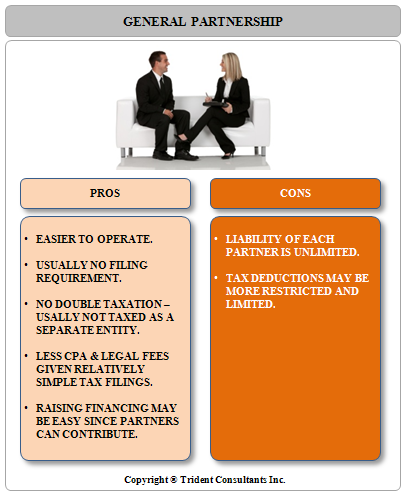Home Starting a Business Free Incorporation Guide - General Partnership
Free Incorporation Guide - General Partnership
The choice of entity and business structure that determines how you as a business owner will conduct your business is very important. There are many options available to the business owner who is looking to begin a new business enterprise or even to someone who is buying an existing business. Keep in mind that the laws and rules governing the different types of entities vary from State to State. Before making this choice we highly recommend that you consult with a CPA (certified Public Accountant) and a qualified attorney. There are many significant implications in the selection of business entity under which you will operate the information presented in this section is only to give the reader a general idea of the type of entities that are available.
The main types of business entities that you can operate under are:
- Sole Proprietor
- General Partnership
- Limited Partnership
- Limited Liability Partnership
- S-corporation
- C-corporation
- Limited Liability Company
2. General Partnership

A partnership is when two or more parties come together under a verbal or written agreement to conduct business together. Unless specifically mentioned each partner has an equal share in the partnership and is takes away an equal share of the partnership profits. Usually, most partnerships have a written agreement that lays out the terms of the capital contributions, profit sharing, decision making process and other day to day activities of a partnership.
Like the sole proprietorship model, a general partnership is relatively easy to put together. In its simplest form two or more people get together, put up a shingle and go to work but as always we highly recommend that competent legal counsel be retained before making any decision. There is no formal requirement of filing with the state and there is no separate legal entity. A partnership usually dissolves upon the death of one of the partners but usually the agreement allows the other partners to buy out the deceased partners share from his estate. All taxes are passed through directly to the partners and the partnership does not incur any tax liability in its own name.
Unfortunately, since a general partnership is not a separate legal entity each of the partners is both individually and jointly responsible for any liabilities or claims that may arise against the partnership. Each partner is deemed to be an agent of the partnership and his or her actions binds the entire partnership.
Most partnerships have agreements that require consent of all or majority of partners before admitting a new partner or to settle matters of disagreements.
Small Business Owner Resource Center

Articles on the Small Business Financing Sources, the Small Business Loan Basics, small business loans Checklist and SBA Loans are incredible sources of knowledge for the small business owner.

Credit Report and Credit Score Analysis, how to Read a Personal Credit Report and all about Business Credit cover the intricacies of credit and are required reading for everybody.

The Foundation Grant Directory is a free listing of sources for grants by state. Why not look if there is some free money out there for your business. Hey - you never know!

The Business Loan Application covers every item you will need in your loan package and tells you how to get approved for business loans.

Fire your loan broker and use our Free Business Loans Bank / Lender Directory to find every bank in the country lending to small businesses.

If you are looking to start a business - look no further. Check out the Free Incorporation Guide discussion and the State Incorporation Resource Directory.
